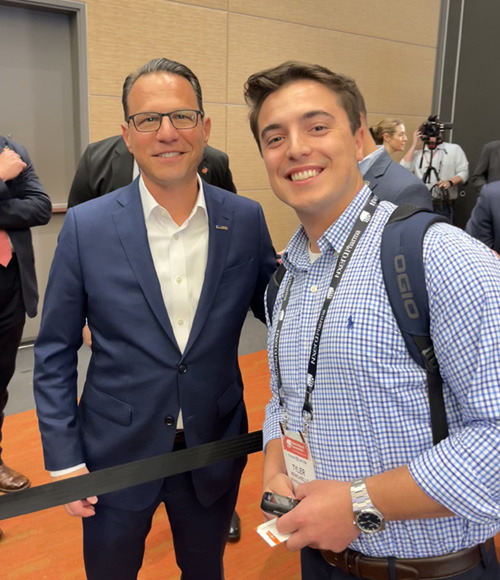Governor Josh Shapiro On Supporting Biomanufacturing In Pennsylvania

By Tyler Menichiello, Chief Editor, Bioprocess Online

In my recap of this year’s BIO International Convention, I briefly touched on Governor Josh Shapiro’s fireside chat with BIO CEO, John Crowley. The governor’s message was loud and clear: Pennsylvania is positioning itself to be a hub of biopharma innovation and manufacturing. Yet, with recent cuts to biomedical research and an administration rife with anti-vax sentiment, Shapiro — and indeed biopharma as an industry — may be facing an uphill battle.
But he’s not backing down.
During the hour-long chat, Shapiro outlined his plans to support and grow the life sciences industry in Pennsylvania — which is focused on economic development and biomanufacturing infrastructure. Afterwards, I had the great opportunity to meet the governor and ask him about his administration’s plans to incentivize biomanufacturing in the commonwealth — both in terms of jobs and manufacturing operations — as well as his plans to support the next generation of Pennsylvania’s biopharma workforce. His answer aligned with his talking points from the fireside chat:
“We’re investing in CTE [Career and Technical Education] and apprenticeship programs to give that eighth-, ninth-, 10th-grader who's interested in this a pathway right into one of these great companies where you don't need an advanced degree. Second, for these companies, we're just moving at lightning speed. Our permitting processes, and all that, allows people to get to market quickly. Third, we're trying to bring more capital into our state to take those who are studying and coming up with breakthroughs at the university and allowing them to commercialize it in Pennsylvania. Some of those dollars are coming from the Commonwealth; some of them are coming from the private sector that we've been able to leverage and bring in. I think all of that together is going to help build up our ecosystem and push back on the federal cuts that I think are really dangerous.”
Let’s unpack each of these points and add some context.
The governor’s first point about education is backed by stats. As of April, 2025, the governor had increased funding for CTE and apprenticeship programs by nearly $65 million — 50% more than the start of his term. Education is one of the three areas the governor said he’s focused on every day, next to safety and economic development.
Building Pennsylvania’s BioEconomy At “Lightning Speed”
Governor Shapiro’s second point was in regard to his administration’s overhaul of permit processing to make it faster and easier to get a business permit in the Commonwealth. Pennsylvania’s permit process was broken, Shapiro said. “We were literally at the bottom of the pack in the nation for how long it would take to get a permit.”
When the governor was sworn in — two and a half years ago — it took roughly eight weeks to get a business license. Today, it takes only 24 hours to get that same license. “And that is true of all 2,400 of the permits that we issued,” he said.

Governor Josh Shapiro (left) With Bioprocess Online's Chief Editor, Tyler Menichiello (right)
“We are so confident that we can deliver a permit quickly, we have a money-back guarantee,” Shapiro told the audience. This guarantee keeps the bureaucracy accountable, he said, and in the past year and a half, only four refunds have had to be issued.
By making it easier to start business in Pennsylvania, Shapiro hopes to make Pennsylvania an appealing state for young entrepreneurs to begin their life science startups.
State Investment In Innovation Amid Federal Funding Cuts
Governor Shapiro’s third point is perhaps the most consequential: a proposed $50 million state investment to strengthen Pennsylvania’s life science sector. Of that investment, $30 million would be used to build a clinical trial network connecting the state’s top research institutions, to help accelerate trials, reduce costs, and more easily commercialize discoveries.
Shapiro noted that a major goal of his administration is to retain the talent, innovation, and entrepreneurship from these universities in-state. Pennsylvania has its own kind of research triangle, he said, anchored by the University of Pittsburgh, Pennsylvania State University, and the University of Pennsylvania (which I propose renaming “The Keystone Corners”). These institutions, and indeed their regional ecosystems, are the reason that Pennsylvania is number four in the country for patents in the life sciences, according to Shapiro.
Despite this national ranking, “We only get 3% of the venture capital dollars to commercialize those great things that are coming out of our colleges and universities,” said Shapiro. “My task is to figure out how to connect the dots, and how to have more commercial wins.” The remaining $20 million from Shapiro’s budget proposal is intended to help address this gap and support commercialization.
But even with this statewide investment, it won’t be enough to counterbalance the devastating federal funding cuts this administration has made to biomedical research. “If you think states are going to be able to make up for these federal cuts, you are wrong,” Shapiro told the audience. “No state has the budget to do that.”
Governor Shapiro’s efforts to bolster Pennsylvania’s biotech industry are commendable, but the industry is a lot bigger than the Keystone State. These recent funding cuts will have a ripple effect, disrupting the innovative pipeline of products from academia to industry. State-driven initiatives are a start, but it will take action from stakeholders across the space — and most importantly, members of the federal government — to mitigate the damage of lost funding on the life sciences. The United States’ leadership in biotech depends on it.
